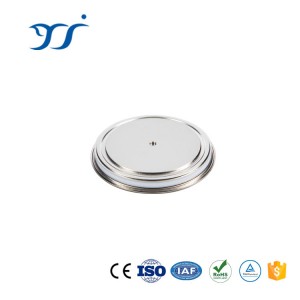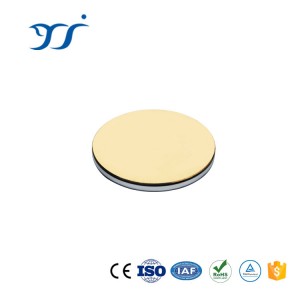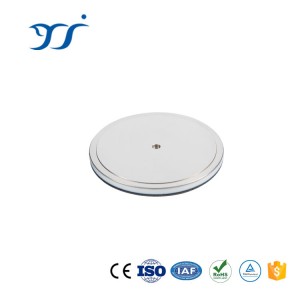INSPECTION AND PACKAGE OF ZW SERIES WELDING DIODE
Test methods and inspection rules
1. Batch by batch inspection (Group A inspection)
Each batch of products should be inspected according to Table 1, and all items in Table 1 are non-destructive.
Table 1 Inspection Per Batch
| Group | InspectionItem |
Inspection Method |
Criterion |
AQL (Ⅱ) |
|
A1 |
Appearance | Visual inspection (under normal lighting and vision conditions) | Logo is clear, surface coating and plating are free of peeling and damage. |
1.5 |
|
A2a |
Electrical Characteristics | 4.1(25℃), 4.4.3(25℃) in JB/T 7624—1994 | Polarity reversed: VFM>10USL
IRRM>100USL |
0.65 |
|
A2b |
VFM | 4.1(25℃) in JB/T 7624—1994 | Complaint to the requirements |
1.0 |
| IRRM | 4.4.3 (25℃,170℃) in JB/T 7624—1994 | Complaint to the requirements | ||
| Note: USL is the max limit value. | ||||
2. Periodic inspection (Group B and Group C inspection)
According to Table 2, the finalized products in normal production should be inspected at least one batch of Group B and Group C every year, and the inspection items marked with (D) are destructive tests. If the initial inspection is unqualified, additional sampling can be re-inspected according to Appendix Table A.2, but only once.
Table 2 Periodic Inspection (Group B)
| Group | InspectionItem |
Inspection Method |
Criterion |
Sampling Plan | |
| n | Ac | ||||
| B5 | Temperature cycling (D) followed by sealing |
|
Measurement after test:VFM≤1.1USL
IRRM≤2USL not leakage |
6 | 1 |
| CRRL | Briefly give the relevant attributes of each group, the VFM and IRRM values before and after the test, and the test conclusion. | ||||
3. Identification inspection (group D inspection)
When the product is finalized and put into production appraisal, in addition to the A, B, C group inspections, the D group test should also be done according to Table 3, and the inspection items marked with (D) are destructive tests. Normal production of finalized products shall be tested at least one batch of Group D every three years.
If the initial inspection fails, additional sampling can be re-inspected according to Appendix Table A.2, but only once
Table 3 Identification Test
|
No |
Group | InspectionItem |
Inspection Method |
Criterion |
Sampling Plan | |
| n | Ac | |||||
|
1 |
D2 | Thermal cycle load test | Cycle times: 5000 | Measurement after test:VFM≤1.1USL
IRRM≤2USL |
6 |
1 |
|
2 |
D3 | Shock or vibration | 100g: hold 6ms, half-sine waveform, two directions of 3 mutually perpendicular axes, 3 times in each direction, total 18 times.20g: 100~2000Hz,2h of each direction, total 6h. |
Measurement after test: VFM≤1.1USL IRRM≤2USL |
6 |
1 |
|
CRRL |
Briefly give the relevant attribute data of each group, the VFM , IRRM and IDRM values before and after the test, and the test conclusion. | |||||
Marking and Packaging
1. Mark
1.1 Mark on the product include
1.1.1 Product number
1.1.2 Terminal identification mark
1.1.3 Company name or trademark
1.1.4 Inspection lot identification code
1.2 Logo on the carton or attached instruction
1.2.1 Product model and standard number
1.2.2 Company name and logo
1.2.3 Moisture-proof and rain-proof signs
1.3 Package
Product packaging requirements should comply with domestic regulations or customer requirements
1.4 Product document
The product model, implementation standard number, special electrical performance requirements, appearance, etc. should be stated on the document.
The welding diode produced by Jiangsu Yangjie Runau Semiconductor is widely applied in resistance welder, medium and high frequency welding machine up to 2000Hz or above. With an ultra-low forward peak voltage, ultra-low thermal resistance, state of art manufacture technology, excellent substitution ability and stable performance for global users, the welding diode from Jiangsu Yangjie Runau Semiconductor is the one of the most reliable device of China power semiconductor products.





